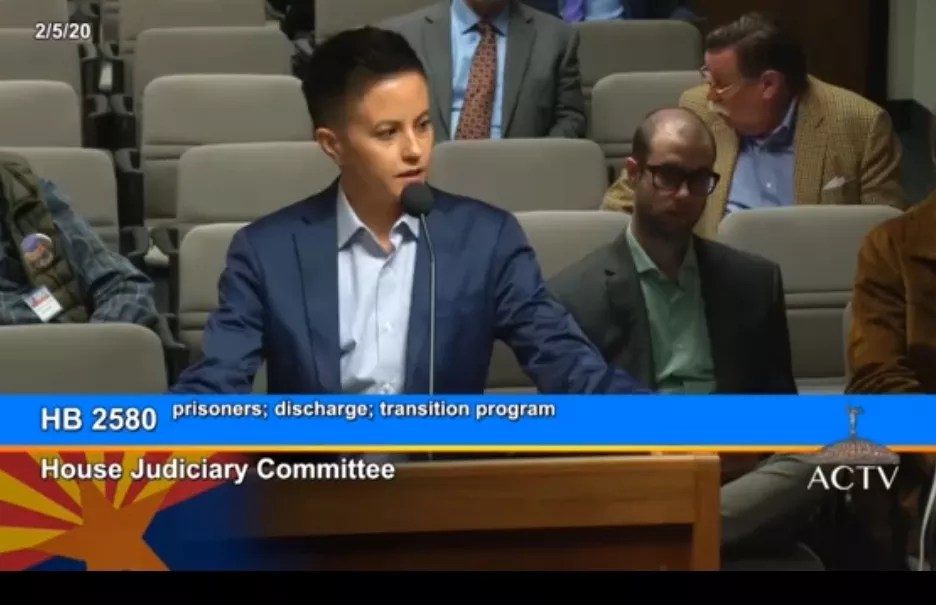
Arizona State Legislature

Audio By Carbonatix
How long is too long to be charged for a victimless crime you committed years ago? Should it matter that you’ve turned your life around in the intervening years?
Danielle Sutherland was arrested several times in 2015 while in grips of a crippling addiction to prescription pills – a faulty coping mechanism she developed after being raped and honorably discharged from the Navy years earlier. She pleaded guilty to the crimes she was charged with each time, suffered the consequences, completed a short prison stint and probation, and changed her life for the better. She sought help, began pursuing a degree in social work, and quit abusing drugs.
Now, just as she is about to graduate from Arizona State University, the Maricopa County Attorney’s Office has finally filed charges against Sutherland for a DUI she committed in October 2015. She is facing a 10-month prison sentence.
“Did I make a mistake and do I deserve to be punished? Yes. But I don’t think a prison sentence for me today is appropriate given what I’ve done to do better for myself and help my community,” Sutherland told Phoenix New Times. “I take full accountability for everything that I’ve done, but what hurts me the most is that Arizona statutes allow for mandatory sentencing up to seven years without looking at what’s been done since, and whether there’s any circumstances that could allow for probation or mitigated sentencing.”
The story of Sutherland’s past is based on interviews with Sutherland and corroborated by a review of hundreds of pages of court records from Sutherland’s run-ins with the law.
Growing up, her family had instilled in her a sense of pride to be an American. The 9/11 attacks happened while she was attending college. She joined the Navy two years later and become a hospital corpsman, motivated, she said, by a desire to “defend our country and help our men and women recover if hurt.”
One day while stationed in Camp Pendleton, she was sent home sick with a migraine. Her chief knocked on her door later and said he had brought her medication for her head. She took it. The next thing she remembers is waking up early in the morning with the man naked and on top of her.
At first, Sutherland tried to move on with her life as if nothing had happened. But she eventually broke down and was honorably discharged from the Navy in 2005. That traumatic event was the beginning of a decade-long downward spiral for Sutherland as she began to abuse prescription drugs and alcohol as a coping mechanism. After a string of misdemeanor DUI arrests in New Mexico in 2010, her family flew her out to Arizona and had an intervention.
“It didn’t stick in 2010, but that seed was planted,” Sutherland told New Times. “I went to Crossroads [rehab]. I was there for 10 months, but that didn’t stick. Every day I woke up and tried to be better, but I did not dig to where it actually came from until 2014 when I went to a military sexual trauma program in Long Beach.”
While Sutherland ping-ponged between using and staying clean during that time, she did stay out of trouble with the law. But when she returned to Phoenix at the end of 2014, she didn’t continue to receive treatment or counseling and spiraled down even further.
In January 2015, Sutherland was arrested for a misdemeanor DUI in Phoenix. It was handled in veterans court. Sutherland was convicted and sentenced to probation. Six months later, in June, she was arrested for another DUI. Court records indicate that Sutherland was driving under the influence of Klonopin when she rear-ended another person’s vehicle. The person whose car she hit did not respond to messages from prosecutors, and court records do not indicate that the person was injured. (Sutherland says there were no injuries.)
While released and awaiting charges for the June DUI, Sutherland was arrested for two aggravated assaults on health care practitioners within the span of two weeks.
On June 24, Sutherland punched a male health care practitioner in the arm while he was trying to treat her at Good Samaritan Hospital on 12th Street and McDowell Road in Phoenix. Two weeks later, on July 6, Sutherland kicked another nurse in the chest after she had been brought to the hospital by the Phoenix Fire Department in an altered state of consciousness. Sutherland had pulled the intravenous needle out of her arm, causing it to bleed. When a nurse tried to stop the bleeding, Sutherland kicked her.
Police reports state that neither nurse was seriously injured. Neither sought restitution. Both nurses told officers they had contacted police because they believed Sutherland was a danger to herself and others and needed to be stopped. Sutherland told police that she had blacked out both times and had no recollection of either incident. The nurse who was kicked told police she felt probation and counseling would be an appropriate sentence for Sutherland.
For those assaults, Sutherland pleaded guilty and was sentenced concurrently. In September, a judge ordered Sutherland to complete two years of supervised probation, pay thousands of dollars in fines, complete anger management counseling and substance abuse treatment, and take regular drug tests.
But about a month after being sentenced to probation, Sutherland got another DUI. According to an incident report from the Phoenix Police Department, on October 22, Sutherland was seen driving up onto curbs and stopping in the middle of the street. Police responded and she admitted to taking Prozac and Klonopin. She was arrested, taken to South Mountain Precinct, and booked for driving under the influence of drugs. She gave a blood sample, had her vehicle towed, and was released later that day.
On November 17, Sutherland was arrested for yet another DUI in New Mexico. The arrest triggered a warrant for her arrest in Phoenix for violating her probation. Her probation was revoked, then reinstated on December 9, 2015. (Online court records show she was also sentenced to probation, community service, and substance abuse treatment for the New Mexico DUI, which she completed in December 2016.)
As Sutherland began to comply with the terms of her probation, charges from the June 2015 DUI were filed. In September 2016, the Maricopa County Attorney’s Office charged Sutherland with two counts of aggravated DUI for the June 2015 incident. Sutherland pleaded guilty to one count and on January 10, 2017, was sentenced to four months in prison and one year of supervised probation. She was also ordered to pay a litany of fines and complete drug and alcohol counseling.

Sutherland in her Navy uniform.
Danielle Sutherland
When Sutherland got out of prison in summer 2017, she finally turned her life around.
“I got out, I was like, ‘I’m 34, this is ridiculous,” Sutherland said. “I’m sick and tired of being sick and tired.”
So she went to the Veterans Administration and asked for help. She started receiving treatment for her substance abuse issues and underlying trauma, graduated from Phoenix College with an associate’s degree, and began volunteering.
In October 2017, Sutherland was discharged from probation for the aggravated assault cases. A few months later, she was discharged from the one-year probation from the June 2015 DUI. Sutherland was able to get the assault charges reclassified as a single misdemeanor in June 2018, and got the court to restore the civil rights she had lost as a convicted felon.
She enrolled in Arizona State University to pursue a degree in community advocacy and social policy and was set to graduate this May with plans to pursue a master’s degree in public policy in the fall – plans that seem unlikely to materialize now.
In September 2019, Sutherland learned she was being charged for yet another DUI – one that she had committed four years ago when she was still spiraling out of control. She thought it had been dismissed.
On September 11, 2019, the Maricopa County Attorney’s Office filed two aggravated DUI charges against Sutherland for the October 2015 DUI. Phoenix police records on the incident shared with New Times indicate they had requested that the MCAO file charges against Sutherland back in October 2015.
Phoenix police resubmitted charges to the county attorney’s office in 2017, after learning Sutherland had now had two prior DUI convictions – one for the January incident settled in veterans court and one for which she had served a four-month sentence.
“These prior two convictions make this instance of driving under the influence a third offense,” an incident report from Phoenix police states. “Therefore, this case is being resubmitted to the Maricopa County Attorney’s Office and [Sutherland] will be charged with the following: aggravated driving under the influence [a Class 4 felony].”
The statute of limitations for a felony DUI in Arizona is seven years.
“All these years I had been looking online, because it was hanging over me. I was booked, I was processed, but then I was released, and I never heard anything about it again,” Sutherland said. “I was never arraigned, I was never notified. I pulled my driving record, it wasn’t even on there. To finally hear about it again, after all these years and everything I have done to change my life – it just pulled the rug out from under me.”
Occasionally, when people are charged with a felony DUI but the blood results are not back in time for the court date, the charge is dismissed but can be refiled once the blood results are in.
A spokesperson for the Maricopa County Attorney’s Office looked into Sutherland’s case and said they are currently reviewing the status of her case and cannot provide additional comments as to why it took so long for charges to be filed, or whether it is typical to wait so long to file charges for DUIs.
On Friday, Sutherland’s case heads to a settlement conference. If she takes a plea deal, she will be sentenced to 10 months in prison.
Arizona law requires that in cases like Sutherland’s, when a person has been convicted of three or more DUIs – in Arizona or elsewhere – within an 84-month period, they are no longer eligible for probation, pardon, commutation, or suspension of their sentence until serving at least eight months in prison.
For the past two years, bills have been introduced in the Arizona Legislature to allow judges to depart from mandatory minimum sentences in certain cases.
House Bills 2245 and 2376, introduced and later killed in 2020 and 2019 respectively, would have allowed judges to depart from mandatory prison sentences and instead impose a shorter sentence or probation if the court finds that imposing a mandatory prison sentence “would result in an injustice to the defendant” and that the mandatory prison sentence “is not necessary for the protection of the public.” (The bills excluded crimes involving death or serious physical injury, sex crimes against minors, and crimes that involved a “continuing criminal enterprise.”)
“If you’re gonna put someone away for something they did five years ago, don’t you think you should do a little research into what that person is doing today?” Sutherland said. “I take full accountability for what I did. I’m not blaming anyone else. I’m angry at the statutes that allow this. And I’m angry at the Legislature that two years in a row killed a bill that would allow for judicial discretion.”